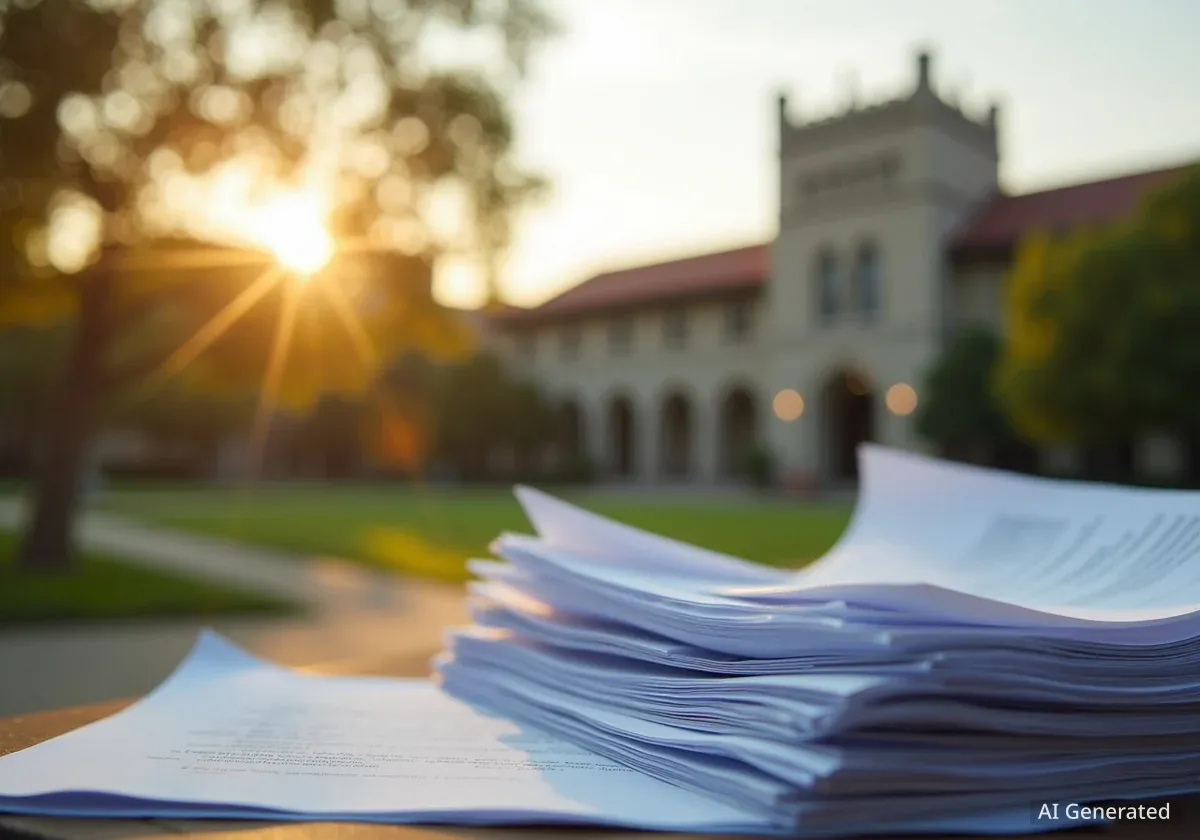A broad coalition representing University of California faculty, staff, and students has filed a federal lawsuit against the Trump administration. The group alleges the government is unlawfully using the threat of withholding federal research funds to interfere with academic freedom and suppress free speech across the university system.
Key Takeaways
- UC-affiliated groups filed a lawsuit claiming the Trump administration is misusing civil rights laws to control university policies.
- The action follows a $1.2 billion fine and a research funding freeze imposed on UCLA.
- The lawsuit argues that these actions threaten academic freedom and are an overreach of federal power.
- The University of California system receives over $17 billion in federal support annually, which is now at risk.
Federal Pressure Mounts on Higher Education
The lawsuit, filed in a San Francisco federal court, represents a significant escalation in the ongoing tensions between major American universities and the current administration. The plaintiffs, which include every labor union for UC workers and the American Association of University Professors (AAUP), claim the administration is weaponizing civil rights statutes to enforce its own political agenda on campuses.
This legal challenge was prompted by recent and severe actions taken against the University of California, Los Angeles (UCLA). The administration accused the school of failing to address antisemitism and other civil rights violations, resulting in a fine of $1.2 billion and a complete freeze on federal research funding.
UCLA is the first major public university to face such a widespread funding cutoff. This move has sent shockwaves through the academic community, as institutions heavily rely on federal grants for scientific and medical research.
A Pattern of Investigations
The actions against UCLA are not isolated. The Department of Education’s Office for Civil Rights has also launched dozens of investigations into other universities and K-12 school districts. Elite private institutions, including Harvard, Brown, and Columbia, have had federal funding frozen or paused over similar allegations, creating a climate of uncertainty in higher education.
The Core Allegations of the Lawsuit
The lawsuit details what the plaintiffs describe as an unlawful campaign to undermine the independence of educational institutions. It argues that the administration is leveraging financial pressure to force policy changes that infringe upon constitutional rights.
"The blunt cudgel the Trump administration has repeatedly employed in this attack on the independence of institutions of higher education has been the abrupt, unilateral, and unlawful termination of federal research funding on which those institutions and the public interest rely," the lawsuit states.
Represented by the legal advocacy group Democracy Forward, the coalition is seeking to block the administration's ability to use funding as a tool for policy enforcement.
Demands Placed on UCLA
According to the court filing, the administration's proposed settlement with UCLA included several controversial demands. If accepted, the university would have to agree to a list of conditions that critics say would fundamentally alter its operations and compromise privacy. These demands include:
- Granting government agencies access to faculty, student, and staff data.
- Releasing sensitive admissions and hiring data to federal officials.
- Terminating all diversity-focused scholarship programs.
- Implementing a ban on any overnight demonstrations on university property.
- Cooperating fully with federal immigration enforcement agencies.
These conditions have been a major point of contention, with faculty and student groups arguing they would create a chilling effect on campus discourse and violate privacy rights.
What's at Stake for the UC System
The University of California system receives more than $17 billion in federal support each year. This includes nearly $10 billion for Medicare and Medicaid, along with critical funding for research grants and student financial aid. The administration's actions threaten this entire financial foundation.
University Leadership Responds to the Crisis
While the University of California system is not a direct party in this specific lawsuit, its leadership has been vocal about the escalating federal pressure. UC President James Milliken recently described the situation as one of the most serious challenges in the university's 157-year history.
In a public statement, Milliken confirmed that all 10 UC campuses are currently facing federal investigations or other administrative actions, though he did not provide specific details on each case. He emphasized the profound impact that a loss of funding would have on the institution and the public it serves.
Stett Holbrook, a spokesperson for the UC system, reiterated these concerns. "Federal cuts to research funding threaten lifesaving biomedical research, hamper U.S. economic competitiveness and jeopardize the health of Americans who depend on the University’s cutting-edge medical science and innovation," Holbrook stated. He confirmed the university is pursuing its own legal and advocacy efforts to restore financial stability.
A Broader National Strategy
The administration's focus extends beyond allegations of antisemitism. It has also initiated investigations into diversity, equity, and inclusion (DEI) programs at numerous universities. The stated reason for these probes is the concern that such initiatives discriminate against white and Asian American students.
This strategy appears to follow a template established in a recent settlement with Columbia University. This summer, Columbia agreed to pay $200 million to resolve government investigations into alleged violations of federal antidiscrimination laws. In return, more than $400 million in frozen research grants were restored.
Legal experts suggest that the Columbia settlement is now being used as a model for negotiations with other universities. The significant financial penalties are becoming an expected component of resolving these federal investigations, placing institutions in a difficult position where they must choose between costly settlements or the complete loss of essential research funding.
The Department of Justice has not yet issued a public response to the lawsuit filed by the UC coalition.





